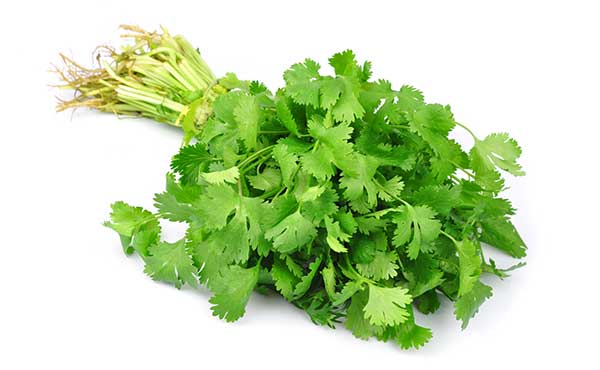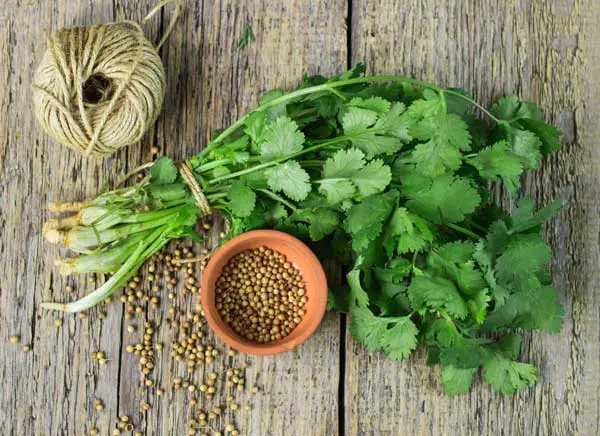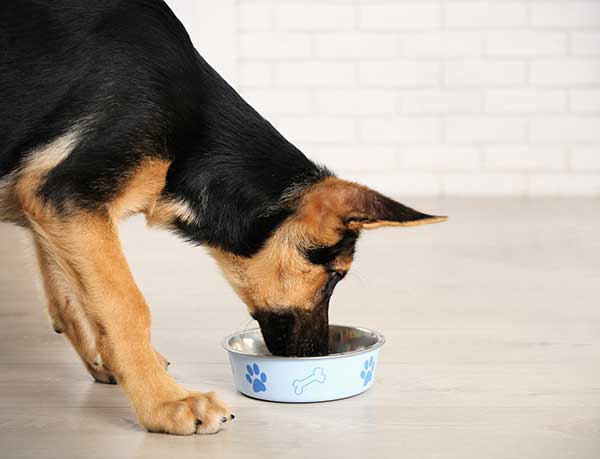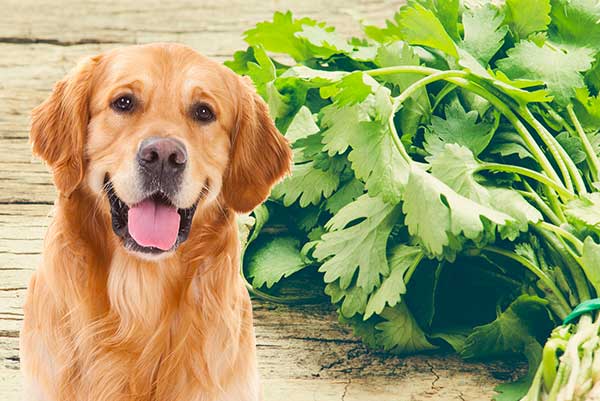It’s every dog owner’s dream to raise a healthy, strong, and bubbly canine.
Raising a healthy dog mainly comes down to nutrition and exercise. While it’s easy to choose the perfect workouts for your pooch, the same cannot be said about their foods. That explains why many dog owners find themselves feeding human foods to their canine companions with careless abandon.
But as you shall find, many table foods are potentially toxic to dogs. In fact, some people foods are known to kill dogs in a matter of days. So, where does that leave cilantro? Can dogs eat cilantro?
The short answer is yes, dogs can eat cilantro. It’s a fact that cilantro is used primarily as a spice, and dogs should generally avoid spicy foods. All the same, cilantro carries no immediate toxicity to dogs. In fact, cilantro leaves are rich in important vitamins and minerals that your dog may benefit from. Examples include vitamins (A, B, C, E, and K), zinc, potassium, carbohydrates, and dietary fiber.
However, it’s recommended to offer cilantro to dogs in moderation. That’s because dogs are fundamentally carnivores and only exhibit omnivorous tendencies occasionally. Therefore, your pooch will be happier consuming a diet of meats like raw chicken and salmon.
This post highlights everything there is to know about cilantro for dogs.
Can Dogs Have Cilantro?
As we’ve just pointed out, there’s nothing wrong with feeding cilantro to your dog in moderation. The herb actually carries several health and nutritional benefits.
But while cilantro may offer some benefits to your dog if fed in small amounts, too much of the herb could trigger a host of gastrointestinal complications like vomiting and diarrhea.
In addition to minding the portions of cilantro to feed your pooch, it’s also important to consider the preparation method.
More About Cilantro
The question ‘is cilantro good for dogs’ can be answered in a simple ‘yes.’ But before we delve deeper into the potential health benefits of cilantro for dogs, let’s begin easy by familiarizing ourselves with what cilantro is.
Cilantro, commonly known as coriander and scientifically referred to as Coriandrum sativum, is an annual edible herb that belongs in the Apiaceae family. Cilantro goes by numerous other names, including dhania and Chinese parsley. The herb is native to various regions in Southern Europe, Southwestern Asia, and Northern Africa.
Coriander is most famous for its leaves, which are widely used as a spice in human foods. However, virtually all other parts of the cilantro plant (including the stems, roots, and seeds) are used either in cooking or for medicinal purposes.
Fresh coriander leaves are used as a flavor-enhancer in a variety of foods, including salads, chutneys, guacamole, and salsa. The leaves are also commonly used as garnish for meat, fish, curries, and soup. When used as a spice, cilantro leaves produce a tart, limey taste.

Coriander leaves also contain powerful antioxidants, such as polyphenols. These compounds work synergistically with terpenes to protect against cell damage occasioned by oxidative stress. Terpenes are the specific compounds that give dhania its distinctive taste and aroma.
Although not as common as the leaves, cilantro seeds are also famous for their flavor-enhancing and therapeutic properties. Cilantro seeds are rich in the terpenes linalool and pinene. Linalool and pinene produce lavender and piney fragrances, respectively. Overall, coriander seeds give a lemony citrus flavor.
As a cooking ingredient, cilantro seeds typically exist as whole seeds or ground powder. The seeds are generally roasted or heated before they can be used. The heating process amplifies their flavor and pungency.
And while they can be used in a variety of cuisines, coriander seeds are commonly used in pickling vegetables as well as in making sausages. The seeds may also be used alongside orange peel in brewing beer to add citrus overtones.
The roots are another useful part of the coriander herb. Known for their deeper and more intense aromas, cilantro roots are a staple ingredient in numerous Asian cuisines, particularly Thai dishes.
So is cilantro safe for dogs?
From the above explanation, it seems like coriander is a welcome inclusion in all human foods. But can we say the same about our canine friends?
Although we’ve already mentioned it, it warrants repeating that dogs can only eat cilantro in moderation. Coriander leaves, in particular, are safe for dogs. The leaves also come with additional health and nutritional benefits.
However, too much coriander could harm your pooch. Plus, your dog may not even like the taste of cilantro. Note that even among the human population, cilantro doesn’t enjoy global fame. A significant number of people have expressed utter dislike for coriander aroma. Plus, the herb is infamous for its ability to trigger allergic reactions..
- One (1) 23.5 lb bag of ORIJEN Amazing Grains Original Dry Dog Food
- Nutrient-dense, grain free* dry dog food formula tailored to support your dog’s immune function, digestion, skin and coat through all life stages
- Dry dog food made with the most succulent and nutrient-rich parts of the prey, containing 85 percent** animal protein and ORIJEN WholePrey ingredients…
Last update on 2025-01-03 / Affiliate links / Images from Amazon Product Advertising API
Do Dogs Like Cilantro?
It’s now abundantly clear that measured portions of cilantro are unlikely to harm your dog. But the mere fact that dogs can eat coriander doesn’t necessarily mean they’ll like the herb. To answer this question adequately, it’s important to understand what feeding group dogs belong in.
Now, animals in the canine family are commonly classified as carnivores. However, the domestic dog is technically an omnivore. While your dog’s wild cousins like the wolf thrive exclusively on a diet of animal protein, the domestic dog can snack plant-based foods occasionally.
In fact, you must have caught your canine friend nibbling on grass blades in your backyard from time to time. Plant extracts can relieve digestive issues in dogs, such as constipation and diarrhea.
But while dogs are omnivores, they don’t fall in the same dietary spectrum as humans. A human can live exclusively on either plant- or animal-based products. On the contrary, canine diet should comprise at least 80% animal products. Since coriander is technically a plant, your dog can only consume it in moderation. Never replace your dog’s regular food with cilantro or any other plant-based products.
So, can dogs eat coriander?
Yes, they can. But only in moderation.
What about liking, will your dog like cilantro?
There’s no telling outright whether your dog will develop an instant love affair with cilantro or not. Cilantro flavors may enchant some dogs and repulse others. As a dog owner, the onus is on you to investigate whether your pooch loves cilantro or not. That includes introducing cilantro to the animal in small amounts and monitoring him over a 24-hour-period for any adverse effects.
If it turns out that your dog loves cilantro, it’s reassuring to note that the herb boasts immense health and nutritional properties that the animal may enjoy.
Cilantro Health Benefits For Dogs
100 grams of cilantro leaves (about 3.5 ounces) contains the following nutritional profile;
- 95 kilojoules (23 kilocalories) of energy
- 92.2 grams of water
- 3.67 grams of carbohydrates
- 2.8 grams of dietary fiber
- 1.13 grams of protein
- 0.52 grams of fat
- 0.08 grams of sugars
- 521 milligrams of potassium
- 67 milligrams of calcium
- 48 milligrams of phosphorus
- 46 milligrams of sodium
- 27 milligrams of Vitamin C
- 26 milligrams of magnesium
- 2.5 milligrams of Vitamin E
- 1.77 milligrams of iron
- 1.114 milligrams of Vitamin B2 (Niacin)
- 0.57 milligrams of Vitamin B5 (Pantothenic acid)
- 0.5 milligrams of zinc
- 0.43 milligrams of manganese
- 0.162 milligrams of Vitamin B2 (Riboflavin)
- 0.149 milligrams of Vitamin B6
- 0.067 milligrams of Vitamin B1 (Thiamin)
- 3930 micrograms of beta-carotene
- 865 micrograms of lutein zeaxanthin
- 337 micrograms of Vitamin A
- 310 micrograms of Vitamin K
- 62 micrograms of Vitamin B9 (Folate)

Based on the above nutritional profile, the following are the specific ways cilantro may benefit your dog;
1. Aiding Digestion
Cilantro is rich in dietary fiber. Dietary fiber exists in two forms, namely soluble fiber and insoluble fiber.
Soluble fiber nourishes gut microbiota. These fibers also play a role in lowering the risks of heart disease. On the other hand, insoluble fiber adds bulk to stool, thereby ensuring regular bowel movements.
Supplementing your dog’s diet with cilantro is an effective way to relieve constipation, flatulence, and other common digestive disorders.
Collectively, soluble and insoluble fiber creates a sense of fullness for longer. If you’re trying to control the food portions your dog consumes, it would help to feed him some cilantro leaves from time to time.
2. Pain Relief
Cilantro offers immense analgesic and anti-inflammatory benefits. A study published in 2015 found that the drug naloxone blocked the effects of coriander extracts.
Naloxone is the same drug that inhibits the activity of conventional opioids. Therefore, it was logical to deduce that coriander contains analgesic properties.
In a similar experiment involving 68 participants with frequent migraines, cilantro extracts were put to the test to establish their analgesic claims. The participants were split into a coriander group and a control group. After one month, the coriander group reported a substantial reduction in the severity of migraine symptoms.
3. Detoxification of Heavy Metals
Coriander has also been shown to aid in the cleansing of metal toxins from the body.
The detoxification process can happen directly through some of the minerals present in these herbs.
It may also occur indirectly through frequent bowel movements. We’ve just pointed out the role of dietary fiber in regularizing bowel activity.
- More probiotics per serving (6 billion CFUs) – Our Probiotics soft chews for dogs help support proper digestion and bowel health with a delicious…
- Premium natural ingredients + made in the U.S.A. – At Pet Honesty we’re committed to premium quality ingredients and strict safety standards. Our…
- Supports healthy digestion + nutrient absorption – Our Probiotic soft chews balance your dog’s intestinal microflora and maintain proper gut pH…
Last update on 2024-12-31 / Affiliate links / Images from Amazon Product Advertising API
4. Combating Anxiety and Insomnia
Like humans, dogs also suffer from anxiety disorders from time to time. Separation anxiety and post-traumatic stress disorder (PTSD) are some of the most common anxiety disorders in dogs.
Separation anxiety is common in dogs that spend a great deal of their time alone without enough physical and mental stimulation. PTSD mostly affects dogs that have experienced a traumatic past.
Cilantro can alleviate the symptoms of anxiety, regardless of the anxiety disorder that your dog is suffering from. When consumed, coriander relieves anxiety by stimulating various ‘feel-good’ hormones in your dog, such as dopamine and serotonin.
Cilantro also contains mild sedating properties. Therefore, the herb may combat insomnia by shortening your dog’s sleep latency.
5. Prevention of Disease
There’s a host of medical conditions in dogs that you can prevent or treat using cilantro.
For starters, cilantro is rich in antioxidants like polyphenols. Polyphenols are famous for their ability to guard against chronic diseases, such as cancer, diabetes, and osteoarthritis.
In a 2019 study examining the anti-cancer properties of coriander, researchers discovered that the herb could make prostate cancer cells less invasive by inhibiting the expression of specific genes in these cells.
Subsequent studies have shown that cilantro extracts may suppress the proliferation of breast cancer cells by mediating damage caused by oxidative stress.
Still on disease prevention, cilantro leaves contain antibacterial and antifungal properties. As such, the leaves may help treat bacterial and fungal infections, particularly digestive diseases.

6. Masking Bad Breath
Like most dog owners, you probably love to snuggle with our canine friends on the couch, catching up on our favorite Netflix series. However, these crucial bonding sessions can get ruined if your pooch happens to have a bad breath.
Since cilantro boasts immense antibacterial properties, the herb may destroy oral bacteria that cause tooth decay and foul-smelling breath. Coupled with its antioxidant properties, coriander can also go a long way in guarding your dog’s gums against infection.
However, note that cilantro shouldn’t eliminate the importance of brushing your dog’s teeth regularly.
7. Boosting Skin Health and Vision
Cilantro has also been cited for its positive effects on the skin.
According to a 2015 study published in the Journal of Medicinal Food, cilantro demonstrated remarkable promise in mediating skin damage occasioned by ultra B (UVB) radiations.
Unknown to many dog owners, our canine friends have fairly sensitive skin. Exposure to over 30 minutes of intense sunshine may lead to sun-related skin damage, such as sunburn.
Cilantro is also rich in vitamin A, which is known to boost vision.
The following are additional health benefits of cilantro for dogs, based on specific vitamins and minerals;
- Vitamin C – Boosts bone strength and regulates blood clotting
- Vitamin K – Maintains the health and development of blood vessels while also playing a role in skin regeneration and development of creative tissue
- Calcium – Works synergistically with vitamin C to aid blood clotting and the development of bones
- Magnesium – Aids metabolism and energy production
- Iron – Aids blood circulation and the development of red blood cells
- Works as a dog food topper – For pet parents looking for an alternative to capsules, raw treats, or soft chews, all it takes is a few pumps of Salmon…
- A tasty & body nourishing treat for cats & dogs – Essential fatty acids for a healthy coat.
- Powerful Omega Fatty Acids – This premium fish oil liquid formula is loaded with the healthy Omega-3 fatty acid (with epa and dha) to support health…
Last update on 2025-01-15 / Affiliate links / Images from Amazon Product Advertising API
Is Cilantro Bad For Dogs?
We’ve already gone through some of the health benefits of cilantro for dogs. But before you feed this herb to your pooch, it’s only fair that you also know what could go wrong.
So, what happens if my dog eats cilantro?
By virtue of being a plant-based extract, cilantro carries inherent risks of gastrointestinal distress. That’s especially true if you’re feeding this herb to your canine friend more frequently than you should.
The following are other potential dangers of cilantro for dogs;
1. Diarrhea
Coriander is rich in dietary fiber. The fiber can help your dog’s bowel activity, while also improving his gut’s health. However, too much fiber may produce a laxative effect, triggering diarrhea.
2. Allergic reactions
Cilantro is also infamous for its hyperallergenic nature. Common symptoms of dhania allergy in dogs include;
- Upset stomach
- Vomiting and/or diarrhea
- Inflammation in the face or body
- Mild skin rash
- Runny eyes and/or nose
- Respiratory issues like labored breathing
- Irritability
If these symptoms present themselves, it’s recommended to stop feeding cilantro to your dog immediately and consult your vet. The good news, however, is that the risks of cilantro allergy in dogs are minimal.
So, is cilantro poisonous to dogs?
While coriander may pose some risks to dogs, it’s unlikely that your pooch will develop toxicity from eating this herb. Of course, that only makes sense if you feed cilantro to your canine friend in moderation.
How to Feed Your Dog Cilantro?
Now that you’ve familiarized yourself with the health benefits and potential risks of cilantro to dogs, the next logical question is how to serve cilantro to dogs.
For starters, it’s important to understand the specific coriander parts that dogs should eat. Although humans can consume virtually any cilantro part, dogs are better off snacking on cilantro leaves. The roots, stems, and seeds may prove too tough for them to chew even when cooked. If you must feed dhania seeds to your pooch, consider ground seeds.
It’s also important to chop coriander leaves carefully before feeding them to your pooch. You may have always wondered, can dogs eat chopped cilantro?
Yes, it’s actually advisable to chop coriander leaves before offering them to your canine friend.
After settling on the specific coriander parts to feed your pooch, the next step is choosing between raw and cooked cilantro leaves. The good news is that dogs can eat both raw and cooked dhania leaves.
For raw leaves, it’s important to wash the leaves thoroughly to remove any dirt, debris, or external parasites. After that, you can chop the leaves and sprinkle them over your dog’s regular food.

Maybe you’ve always wondered, can dogs eat fresh cilantro?
Yes, dogs can certainly eat fresh cilantro. Just ensure you wash the leaves thoroughly and chop them into fine pieces before giving them to your dog.
If you decide to cook the leaves, consider boiling or steaming them. Keep the heat high enough to kill any parasites and low enough to keep all the essential minerals intact.
Still on cooking, you should be mindful of the foods that you serve cilantro with. And that begs the question, can dogs eat rice with cilantro?
Both rice and cilantro are completely safe for dogs. So, dogs can definitely eat rice with cilantro.
What of lime rice? Can dogs eat cilantro lime rice?
While rice is safe for dogs, significant amounts of lime may be toxic to them. So, you should generally avoid serving lime rice to your pooch.
Can dogs have dried cilantro too?
Dried cilantro is typically powdered coriander. So, dogs can definitely eat dried cilantro.
Portion is the last factor to consider when trying to serve cilantro to your dog. Whether feeding your dog raw or cooked cilantro, it’s recommended to keep the portions low.
This may get you wondering, can dogs eat a small amount of cilantro and how much cilantro can a dog eat?
There’s no hard and fast rule on the correct amount of cilantro to feed your dog. The portions depend on the animal’s age, body size, activity levels, and general health condition.
The convention is to begin small and build momentum slowly. Observe how your pooch reacts to coriander before possibly upping the quantities.

Conclusion
Cilantro is not only safe for dogs. It also comes with many health and nutritional benefits. But like any plant-based food, coriander is only beneficial to dogs if fed in moderation.
Checkout Our Favorite Dog Products
1. BEST PUPPY TOY
We Like: Snuggle Behavior Toy with Heart Beat & Heat Pack – Ideal toy for new puppies.
2. BEST DOG TRAINING PROGRAM
We Like: Doggy Dan The Online Dog Trainer – Stop any dog problem and raise the perfect puppy with The Online Dog Trainer.
3. BEST DOG PUZZLE TOY
We Like: Outward Hound Interactive Puzzle Toy – Every dog loves chasing squirrels at the park. The Outward Hound Hide-a-Squirrel Puzzle Toy gives your dog the same feeling as though he was outdoors chasing live squirrels.
4. Best Bone Broth for Dogs
We Like: (Solid Gold – Human Grade Bone Broth for Dogs) – Simmered Beef Bone Broth With Turmeric Provides A Nutrient-Dense And Flavorful Addition To Your Dog’s Meal + Rich In Natural Collagen From Beef Bones.
5. Best Multivitamin for Dogs
We Like: PetHonesty 10-For-1 Multivitamin – 10 Benefits in 1 Daily Treat – These Multivitamin Snacks combine a well-rounded blend of the most essential vitamins and supplements including glucosamine, probiotics, vitamins and omegas, for dogs’ overall daily health.



 Luna
Luna




